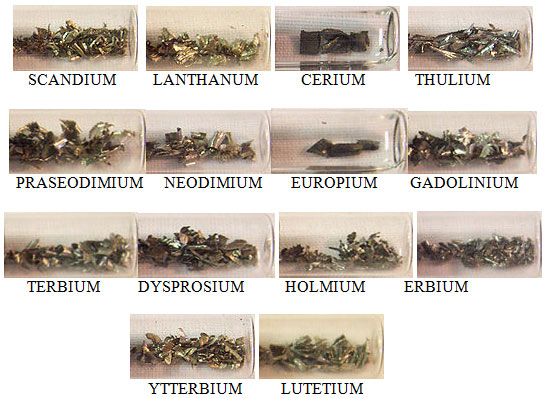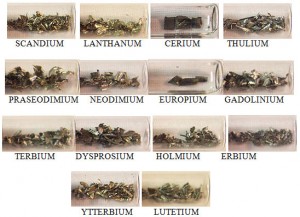
The US Needs Domestic Access to Rare Earth Minerals
Last week, the House passed the National Strategic and Critical Minerals Production Act, H.R. 4402, which streamlines the federal mining permit process. The legislation requires that federal agencies cap the permit review period by federal agencies to 30 months.
It designates domestic mining containing “strategic and critical minerals” an infrastructure project, under the definition given in an executive order from President Obama. The order called for the expedition of federal permitting processes for infrastructure development.
Surface transportation, aviation, ports and waterways, water resource projects, renewable energy generation, electricity transmission, broadband, and pipelines all currently qualify as infrastructure projects.
House Natural Resources Committee Chairman Doc Hastings (R-WA) described the necessity of the bill:
“Burdensome red tape, duplicative reviews, frivolous lawsuits and onerous regulations can hold up new mining projects for more than a decade. These unnecessary delays cost American jobs, as we become more and more dependent on foreign countries for raw ingredients to fuel manufacturing and our economy… This a jobs bill, and the positive economic impact of this bill’s intent will extend beyond the mining industry.”
The bill passed despite opposition concerns that expediting the process would be harmful for the environment and that the definition of “strategic and critical minerals” was too broad, including basically all mining and not just that of rare earth minerals.
Supporters referenced the lack of American production of rare earth minerals as a national security and economic threat to the United States.
China currently produces 97% of the set of 17 “rare earth minerals” that are used in defense equipment, advanced electronics and computing systems, and clean, renewable energy technologies. Recently, China has been trying to control the rare earth market by placing restrictions on exports.
The US, Japan, and EU have filed a complaint against China with the World Trade Organization over China’s attempts at export restrictions on rare earths. In 2010, China suspended exports to Japan and, in 2011, China’s largest producer of rare earths suspended production for a month.
China’s monopoly on rare earth minerals is an avoidable situation. Rare earth minerals are actually not that rare. And, the US has the second-biggest deposit of rare earth minerals in the world but they are not being used.
The problem is the rare earths are very difficult to extract from ore and the process is costly and more environmentally damaging than for other elements. Despite this, they are vital for manufacturing and depending on China for them is a risky venture.
(See ASP’s report “Rare Earth Metals and US National Security” or the fact sheet for more information on rare earth minerals.
The legislation passed in the House but it is seen as unlikely to be taken up by the Senate.
However, there is something more important the Senate should do to make domestic mining a more attractive investment: ratify the Law of the Sea Treaty.
(See ASP’s “Law of the Sea: Separating Fact from Fiction” for more information.)
The Law of the Sea Treaty would provide US companies the legal certainty they need to invest in deep-seabed mining, where it is projected that vast deposits of rare earth minerals lie. Without ratification of the treaty, companies are not willing to invest in the expensive venture because the US would not have internationally recognized claims over the resources in the waters.
Mining for rare earths in the deep-seabed has economic and environmental advantages over land mining. Some research has suggested that deep-sea mining will be cheaper than land mining and yield higher profits. Also, the seafloor deposits are much more concentrated than those on land and would therefore take less processing to extract the minerals, which is the most environmentally destructive part of mining. New technology has also reduced the environmental risk of deep-sea mining. More than one metal can be obtained at one deep-sea site. Land mines leave a substantial footprint but deep-sea mines have no roads, surface ore-transport systems, or other infrastructures.
Jay Timmons, President and CEO of the National Association of Manufacturers, explained the importance of domestic access to rare earths in his testimony to the Senate Committee on Foreign Relations supporting LOTS:
“Without those rare earth materials manufacturing simply will not be able to compete and succeed in the world marketplace… The bottom line is if we can’t access rare earth materials on the floor of the sea, we’re going to be put at a significant competitive disadvantage.”
The Senate has an opportunity to help jump-start the US rare earth minerals market and create jobs in a way that is more environmentally friendly than the House legislation. Plus, there are many, many more advantages that would be afforded to the US economy and national security through ratification of the treaty besides deep-sea mining.
The House recognizes the importance of domestic access to rare earths. Why doesn’t the Senate?







[…] Want to learn more about the Law of the Sea Treaty? Check out our “Separating Fact from Fiction” pamphlet and our discussion on rare earth minerals. […]